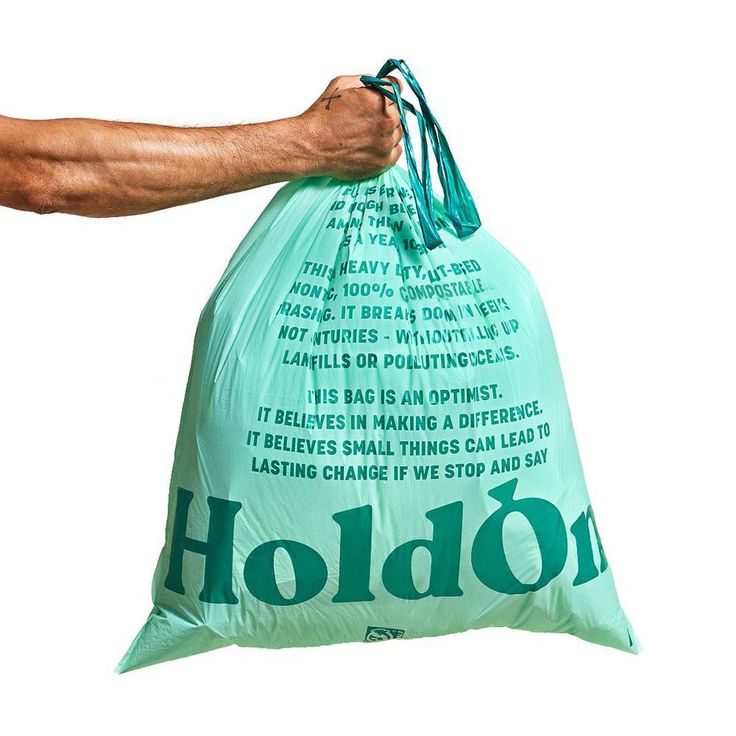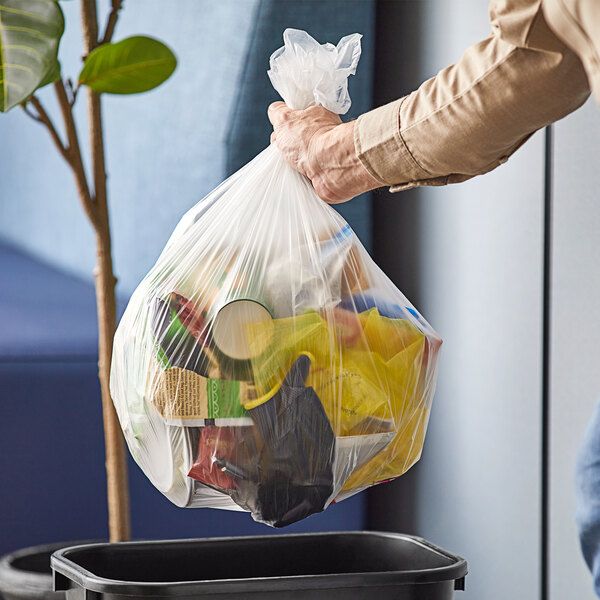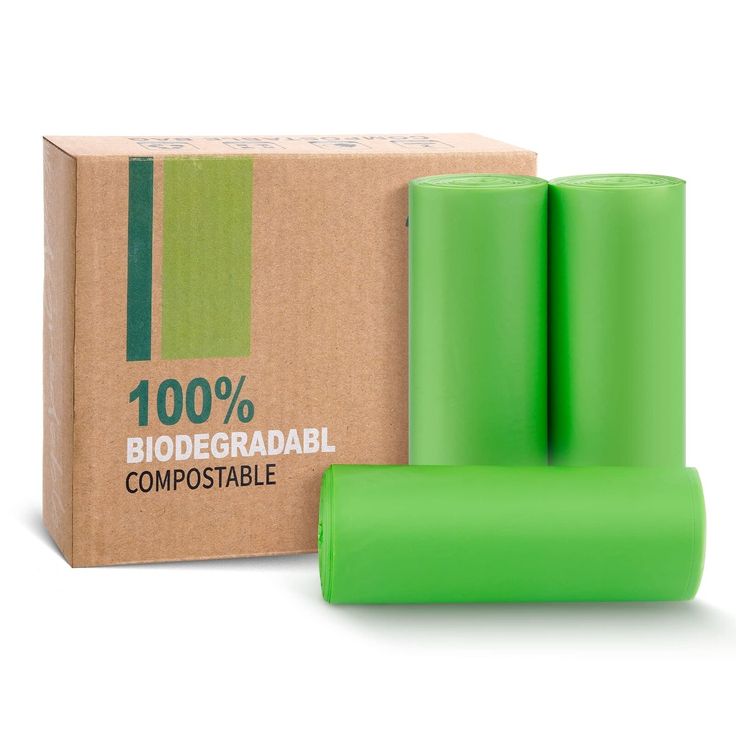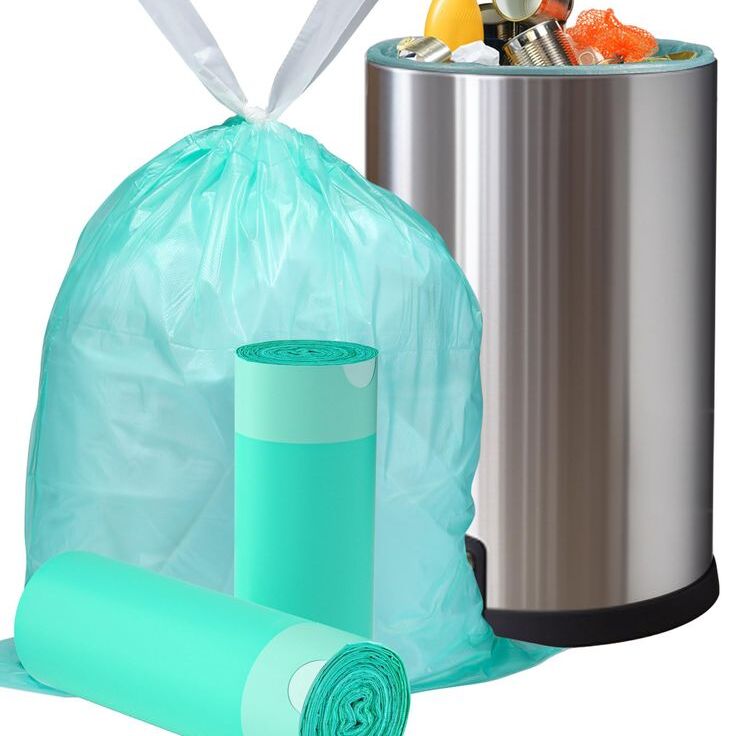In today’s environmentally conscious society, making sustainable choices has never been more crucial. One simple yet impactful change you can make is switching to biodegradable garbage bags in your home. These innovative bags provide a practical solution to the mounting plastic waste problem, helping you do your part for the planet. In this article, we will explore the numerous benefits of biodegradable garbage bags, their differences from traditional plastic bags, their decomposition process, their role in waste management, and how you can incorporate them into your daily life.

What Are Biodegradable Garbage Bags?
Biodegradable garbage bags are products designed to break down into natural substances when disposed of in the right conditions. Unlike their conventional plastic counterparts, which can take hundreds of years to decompose in landfills, biodegradable garbage bags typically decompose within a few months to a couple of years. This rapid breakdown is facilitated by microorganisms, which consume the organic material in these bags and convert it into harmless byproducts such as water, carbon dioxide, and biomass.
- Types of Biodegradable Materials: Various materials can be used to create biodegradable garbage bags, such as cornstarch, vegetable oils, and other plant-based substances.
- Natural vs. Synthetic: Unlike synthetic materials that require extensive time and conditions to break down, biodegradable materials naturally decompose, promoting healthier soil.
- Certification Standards: Look for bags that have certifications, such as ASTM D6400 or EN 13432, ensuring they meet specific biodegradability standards.
Incorporating biodegradable garbage bags into your home not only reduces plastic waste but also contributes to a circular economy.
The Environmental Impact of Traditional Plastic Bags
Traditional plastic garbage bags are a significant contributor to global pollution. Made from petroleum products, they are non-biodegradable and can take anywhere from 500 to 1,000 years to decompose in landfills. During this time, they break down into microplastics, which can contaminate soil and waterways, posing a threat to wildlife and human health.
- Ocean Pollution: An alarming amount of plastic waste ends up in oceans, harming marine life and ecosystems. Animals often ingest or become entangled in plastic debris, threatening their survival.
- Greenhouse Gas Emissions: The production and incineration of plastic bags contribute to greenhouse gas emissions. Using biodegradable garbage bags helps alleviate these emissions and reduce your carbon footprint.
- Landfill Space: Reducing traditional plastic bag usage can significantly decrease the amount of waste sent to landfills, allowing for more efficient waste management practices.
By opting for biodegradable garbage bags, you tackle these pressing environmental issues directly, making a difference one small change at a time.

The Decomposition Process of Degradable Garbage Bags
Understanding how biodegradable garbage bags decompose is key to appreciating their value. When disposed of properly, biodegradable bags undergo a process supported by moisture, oxygen, and microorganisms.
- Microbial Action: Bacteria, fungi, and other microorganisms break down the bags, consuming the organic materials within them. The process is accelerated in a composting environment, where conditions are optimal.
- Timeframe: Depending on the type of biodegradable bag and the conditions of its environment, decomposition can range from several weeks to two years.
- Environment Influence: Factors such as temperature, moisture, and the presence of oxygen significantly affect how quickly biodegradable garbage bags break down.
Choosing biodegradable garbage bags not only supports better waste management practices but encourages a healthy ecosystem and promotes soil health through nutrient-rich compost.
Benefits of Using Biodegradable Garbage Bags
Utilizing biodegradable garbage bags presents a multitude of advantages that extend beyond their environmental significance. Here are the key benefits:
- Reducing Carbon Footprint: Choosing biodegradable trash bags helps minimize your contribution to landfill waste. These bags break down naturally, resulting in lower greenhouse gas emissions compared to traditional plastic bags, effectively lessening your overall carbon footprint.
- Healthier Alternatives: Biodegradable bags are typically crafted from non-toxic materials such as cornstarch or plant-based substances. This makes them safer for both households and pets, reducing the risk of harmful chemicals leaching into the environment and promoting a healthier home.
- Convenience and Usability: Many biodegradable trash bags are designed to mimic the functionality of conventional plastic bags. This ease of use allows for seamless integration into daily routines, ensuring that homeowners do not sacrifice convenience while making eco-friendly choices.
- Positive Environmental Impact: By opting for biodegradable options, you contribute to a reduction in plastic pollution, supporting a cleaner and more sustainable planet for future generations.
Switching to biodegradable garbage bags may seem like a small change, but it can lead to significant benefits for both the environment and your household.

How to Incorporate Degradable Garbage Bags Into Your Lifestyle
Incorporating biodegradable garbage bags into your daily life is both simple and effective. Here are some practical steps to help you integrate them seamlessly into your trash disposal routine:
- Substitute with Ease: Begin by replacing your regular trash and recycling bags with biodegradable options. Focus on high-usage areas first, such as kitchens and bathrooms. This gradual transition allows for easy adaptation without overwhelming changes.
- Educate Family Members: It’s essential to inform everyone in your household about the significance of using biodegradable trash bags. Share how these bags contribute to reducing plastic waste and promoting sustainability, fostering a shared sense of responsibility.
- Proper Disposal: Ensure that you dispose of the biodegradable trash bags correctly. Utilize designated composting or waste facilities to maximize their environmental benefits. This step is crucial for ensuring that the bags break down effectively and do not contribute to landfill waste.
By adopting biodegradable garbage bags in your household, you and your family are actively participating in the movement towards a more sustainable lifestyle and helping to protect the environment for future generations.
Biodegradable Garbage Bags and Waste Management
Biodegradable garbage bags are crucial in contemporary waste management systems, significantly contributing to more sustainable and environmentally-friendly disposal practices. Here are several key points outlining their importance:
- Supporting Composting Initiatives: Many local municipalities actively promote composting programs that encourage the use of biodegradable bags. By utilizing these bags, residents can easily separate their organic waste, which can be transformed into valuable soil amendments. This process not only enriches soil health but also reduces the need for chemical fertilizers.
- Decreasing Landfill Waste: Biodegradable trash bags play a critical role in alleviating the pressure on landfills. Unlike traditional plastic bags, these eco-friendly alternatives break down naturally over time, leading to a significant reduction in the amount of waste that ends up in landfills. This shift allows for more efficient waste management strategies and enhances recycling efforts.
- Promoting Waste Diversion: Biodegradable bags facilitate the separation of organic waste from regular trash, increasing waste diversion rates. This separation is essential for recycling and recovering materials, contributing to a circular economy where resources are reused rather than wasted.
Incorporating biodegradable garbage bags into waste management practices can lead to reduced waste overall and further support sustainability objectives.

The Future of Biodegradable Trash Bags
The market for biodegradable garbage bags is rapidly evolving in response to increasing environmental awareness among businesses and consumers. This evolution is driven by several key factors:
- New Materials and Technology: Researchers are continually exploring innovative materials and technologies to enhance the efficiency and eco-friendliness of biodegradable trash bags. Advances in bioplastics, derived from renewable resources, promise improved biodegradability and functionality, making these bags a more viable alternative to traditional plastic.
- Government Regulation: As concerns over plastic pollution rise, more stringent government regulations regarding the use of conventional plastic bags are anticipated. These regulations are likely to encourage businesses to adopt biodegradable solutions, creating a significant shift in the industry landscape towards greener practices.
- Consumer Demand: The growing consumer preference for sustainable products is driving the market forward. As awareness of environmental issues deepens, people are increasingly seeking high-quality and affordable biodegradable trash bags. This demand is pushing manufacturers to improve their offerings.
In conclusion, the future of biodegradable garbage bags appears bright. These innovations promote sustainable practices that are advantageous for both consumers and the environment. This transformation is essential for fostering a greener planet.

Conclusion:
In conclusion, biodegradable garbage bags present a sustainable and practical solution to one of the world’s pressing environmental issues. Switching from traditional plastic bags to biodegradable alternatives can help minimize your carbon footprint and contribute to healthier ecosystems. Additionally, it promotes waste management initiatives that support sustainable practices.
- Collective Responsibility: Every small choice matters. By opting for biodegradable trash bags, you play a significant part in the larger movement toward sustainability.
- Empowerment Through Education: Educating yourself and others about the benefits of biodegradable products can foster a community of environmentally conscious individuals.
- Continuous Improvement: The journey toward a more sustainable lifestyle is ongoing. Continue exploring further sustainable practices you can implement in your home.
Making informed decisions about waste disposal can positively impact the environment. Switching to biodegradable garbage bags is a responsible and necessary step for any eco-conscious household.

